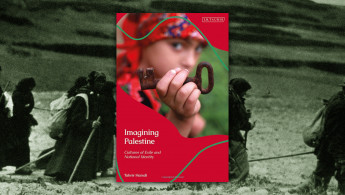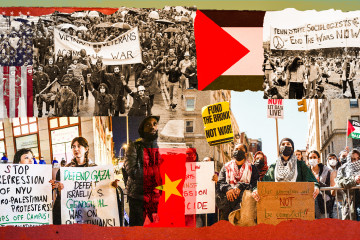From the embers of the Nakba: How reimagining Palestinian collective memory is the key to return
The vastness of the Palestinian experience since the Nakba contributes to the imaginings of Palestine and the Palestinians’ return to their land.
Tahrir Hamdi’s book, Imagining Palestine: Cultures of Exile and National Identity opens with a reminder that “Palestine does not exist on the world map today” – a reminder not only of the Zionist ethnic cleansing during the 1948 Nakba but also of the altered language which now reflects the fragmentation of Palestinian territory into Gaza and the occupied West Bank.
“Resistance was born at the very point of rupture, which has been called Nakba or catastrophe or ethnic cleansing, and now the dispossessed are preparing for their return,” Hamdi writes.
"From the margins, exile extends a temporary feeling as a result of rupture, yet one that seems interminable. In this dimension of exile, the Palestinian experience exists in different identities, experiences, as well as loss which is highlighted by the use of language"
The Nakba and displacement, despite the different Palestinian experiences, created a collective consciousness that unites Palestinians.
Just as the Nakba is ongoing, so is the imagining of Palestine – a collective endeavour that feeds into the Palestinian resistance against Israeli settler-colonialism.
And, as the author points out, “reliance on oral history (memory) is crucial to the accurate understanding of the past, what and how it happened in order to make it possible to imagine/reimagine a future Palestine.”
As Hamdi writes, in a post-colonial era, Palestine is still colonised.
|
Through the work of various Palestinian authors and intellectuals, among them Edward Said, Mahmoud Darwish, Ghassan Kanafani, Susan Abulhawa and Naji Al Ali, the anti-colonial narratives are given space, even as they exist on the margins.
Entering the margin, Hamdi states, is a site of resistance. For Said, for example, the intellectual “lives in a metaphorical exile on the margins of society”.
From the margins, exile extends a temporary feeling as a result of rupture, yet one that seems interminable. In this dimension of exile, the Palestinian experience exists in different identities, experiences, as well as loss which is highlighted by the use of language.
All this pondering happened against a political backdrop in which Palestinians experienced several shifts, from resistance to diplomacy and betrayal. The intellectual, Hamdi reminds, speaks to hegemonic power.
From within exile, in Kanafani’s writing, the importance of culture and identity prevails as a “precondition… without which there could be no successful revolution.”
|
There is no sentimentality in Kanafani’s writing, which is a platform for the author through which dispossession is also theorised.
Referring to memoricide, Hamdi reminds us how Palestinian narratives “become necessarily urgent for the sake of preserving memory against forgetfulness. The discussion that ensues illustrates how return is a collective task and not an individual one.
Barghouti, for example, refers to his return to Palestine as “seeing”. Such an observation points towards the entire Palestinian experience of dispossession: “All residence is exile” be it forced internal or external displacement, the reality of refugee camps, and anywhere else Palestinians are located.
Turning to 1967, when Israel imposed its military occupation over colonised Palestine, Hamdi writes, “Occupation is in itself an exile from what is normal.”
For Palestinians, 1967 reverts to a point of origin through yet another considerable forced displacement. The nuances of return, therefore, are varied and depend on trajectories and experiences.
Seeing, on the other hand, implies the existence of coercion, where the political circumstance forced Palestinians into exile and occasional ventures back or, as in Kanafani’s fictional writing Returning to Haifa, the viewing tainted and imposed by the coloniser onto the colonised.
Hamdi devotes a chapter to walls as spaces of writing. “Revolutionary discourse and art begin on walls – refugee camp walls, apartheid walls, walls that were constructed to keep the oppressed and dispossessed behind walls.”
While the art of Palestine refugees forms part of the collective consciousness, it stands in contrast to the apartheid wall which has become an attraction for graffiti artists whose art, despite the support for Palestine, may not necessarily be in line with Palestinian sentiment.
|
Palestinian art on the apartheid wall draws attention to Israeli colonialism, while art by foreigners normalises the apartheid wall and what it represents for Palestinians.
Hamdi’s in-depth research is an exercise in Palestinian collective memory, and how it presents a formidable bulwark against the Zionist-enforced oblivion.
Memory is assertive, particularly against Zionist narratives that erased Palestinians. Additionally, Palestinian memory expressed through creativity which is also part of the Palestinians’ daily resistance, serves to unify Palestinians in the collective imagining of what Palestine would look like in the event of return.
The Palestinian return requires the dismantling of the Zionist colonisation of Palestine, bringing anti-colonial resistance and its legitimacy to the fore of the discussion, and standing in contrast to the Palestinian Authority’s failed diplomacy which acquiesces to defeat.
Hamdi quotes Palestinian intellectual Basel al-Araj, killed by Israel with the aid of the PA’s security services on decolonisation: “Let us dismantle it [Israel] and let them fall.”
Decolonisation, therefore, also points towards the indigenous resistance of not managing, but reversing oppression.
Return from within the collective experiences creates the need for Palestinian space, which is often generalised from the external perspective of those not experiencing dispossession and colonial violence.
Return would also end the multitude of exiles experienced by Palestinians when the imaginary unites with true decolonisation.
Ramona Wadi is an independent researcher, freelance journalist, book reviewer and blogger specialising in the struggle for memory in Chile and Palestine, colonial violence and the manipulation of international law
Follow her on Twitter: @walzerscent



